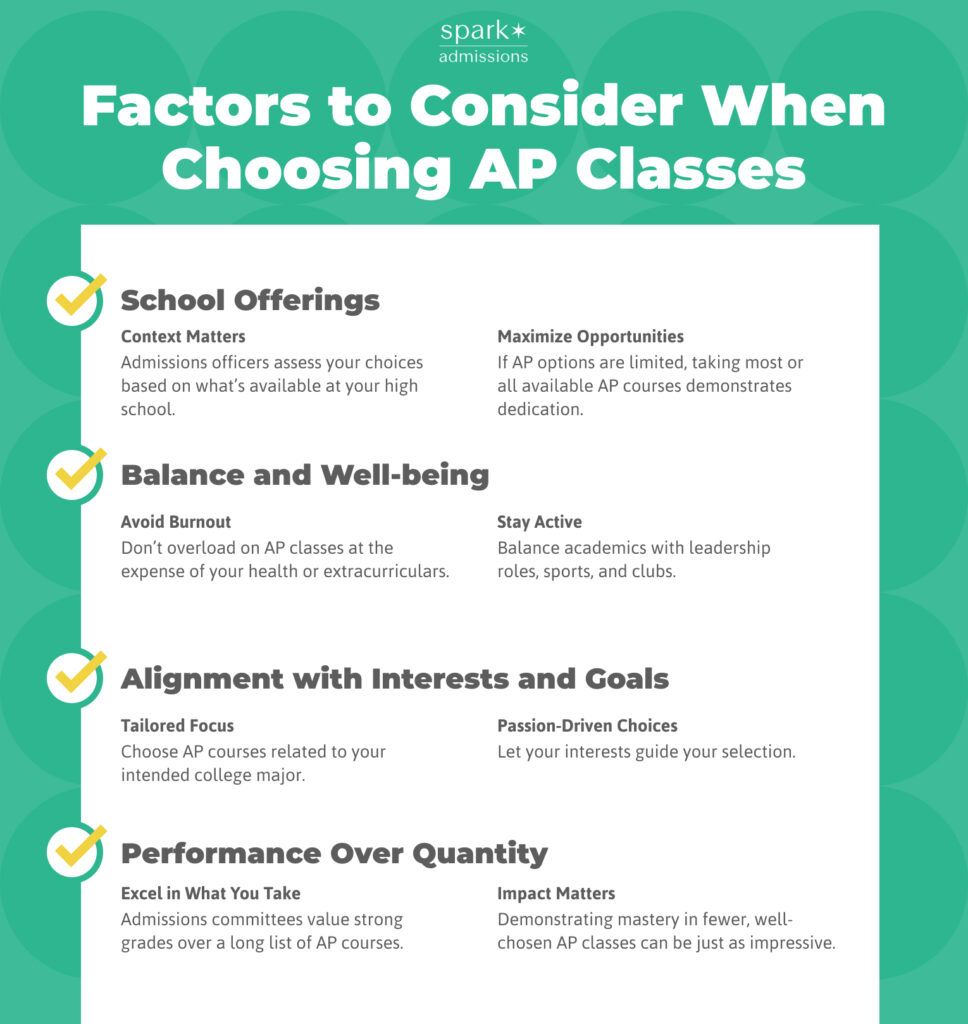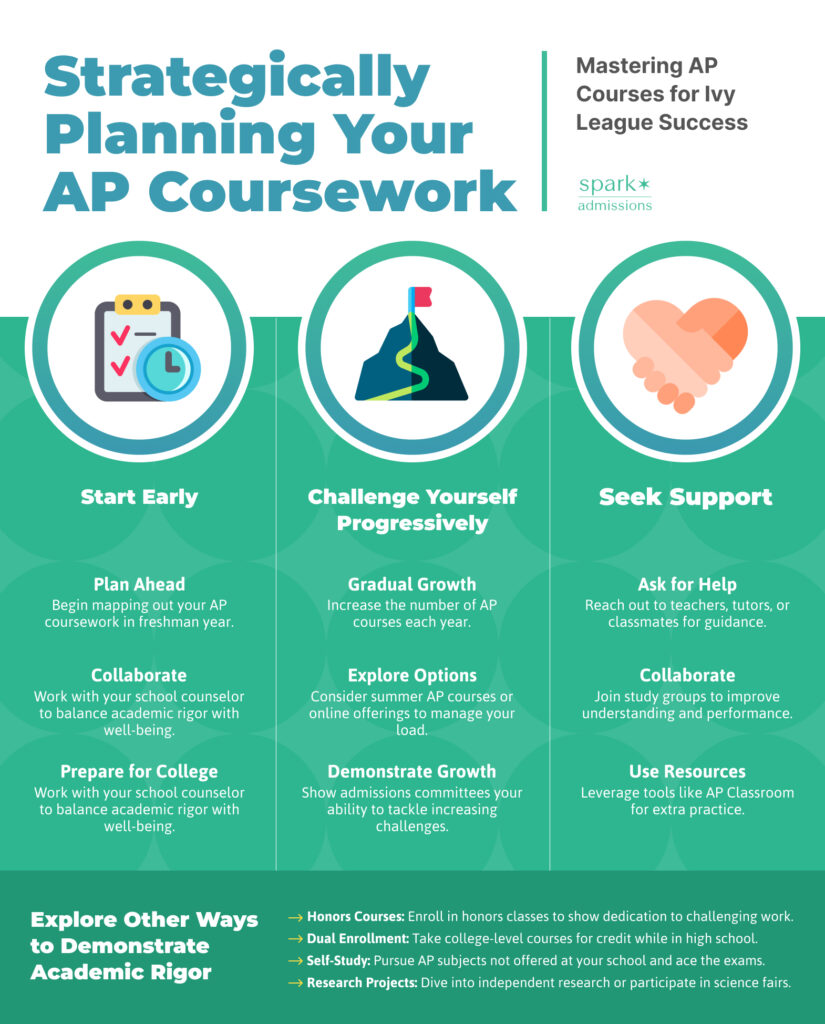- Blog
- > Ivy League Admissions
How Many AP Classes Are Recommended for Ivy League Admissions?
- Dr. Rachel Rubin
- | December 20, 2024

Advanced Placement (AP) classes are a key component of many students’ high school experience, especially for those aspiring to get into an Ivy League university. These courses challenge students academically and showcase their ability to excel in rigorous environments. But how many AP classes do you really need to impress Ivy League admissions committees?
The Ideal Number of AP Classes for Ivy League Schools
There is no one-size-fits-all answer to this question, as top colleges evaluate applications holistically. However, most competitive applicants take between 8 to 12 AP courses during high school. Here’s a general guideline:
- Freshman Year: 1-2 AP courses (if offered)
- Sophomore Year: 2-3 AP courses
- Junior Year: 3-4 AP courses
- Senior Year: 3-5 AP courses
Keep in mind that these numbers are not strict requirements. Admissions officers prioritize quality over quantity, so excelling in fewer AP courses can be just as impressive as taking a full slate, particularly if taking more Advanced Placement courses would cause your grades to suffer.
Why AP Classes Matter for Ivy League Admissions
AP classes demonstrate academic rigor, which is a critical factor for Ivy League college admissions officers. Here’s how they play a role:
Academic Preparedness
AP courses simulate college-level work. Performing well in these classes shows you’re ready to handle the challenges of an Ivy League curriculum.
Weighted GPA Boost
Many high schools award extra points for AP courses, which can elevate your GPA. This is particularly beneficial when competing with other top-tier applicants.
College Credit and Placement
Scoring high on AP exams (usually a 4 or 5) can earn you college credit as a high school student or advanced placement in certain subjects, saving time and money once you’re admitted.
Standout Factor
Taking AP classes can help your application stand out by showing admissions officers that you’ve gone above and beyond the standard high school curriculum.
Factors to Consider When Choosing AP Classes
When deciding how many AP classes to take, consider the following factors:

1. School Offerings
Not all high schools offer the same number of AP courses. Ivy League admissions officers evaluate your application within the context of your school’s course catalog. If your school offers AP classes only in limited quantities, taking all or most of them will still demonstrate your commitment to academic excellence.
2. Balance and Well-being
Taking too many AP classes can lead to burnout and negatively impact your extracurricular involvement, which is also crucial for Ivy League applications. It’s better to excel in fewer AP courses while maintaining strong grades and active participation in clubs, sports, or leadership roles.
3. Alignment with Interests and Goals
Focus on AP classes that align with your academic interests or intended college major. For example, if you’re aiming to study engineering, prioritize AP Calculus, AP Physics, and AP Computer Science over AP English Literature.
4. Performance Over Quantity
Ultimately, performing well in fewer AP classes is better than stretching yourself too thin and risking lower grades or AP exam scores. Quality always trumps quantity in the eyes of Ivy League admissions committees.
How to Strategically Plan Your AP Coursework

To make the most of your AP classes as a high school student, follow these tips:
Start Early
Begin planning your coursework in your freshman year and determine how many AP courses to take each year. Work with your school counselor to map out a realistic schedule that balances academic rigor with personal well-being and prepares you for college admissions down the road.
Challenge Yourself Progressively
Increase the number of AP classes as you move through high school. College admissions councils like to see growth and a willingness to take on multiple AP courses over time. If your school offers summer AP courses or online options, consider taking one to lighten your regular school-year load. Exploring success tips for online classes can also help you manage coursework effectively and stay on track with deadlines.
Seek Support
AP courses can be demanding, so don’t hesitate to seek help from teachers, tutors, or peers. Joining study groups or using online resources like AP Classroom can also boost your academic performance throughout your high school career.
Other Ways to Demonstrate Academic Rigor
Taking AP courses is just one way to showcase your academic strength and determination to prepare for college-level courses. Here are additional ways to sign up for rigorous coursework:
- Honors Courses: If AP classes aren’t available or you want to mix up your schedule, honors courses also demonstrate academic rigor.
- Dual Enrollment: Taking dual enrollment courses for college credit while in high school is another impressive way to show readiness for Ivy League-level work.
- Self-Study for AP Exams: If your school doesn’t offer a specific AP class, consider studying these challenging subjects on your own, preparing yourself to take the exam. Doing so shows initiative and a genuine passion for learning.
- Research Projects: Engaging in independent research or science fairs can further illustrate your intellectual curiosity, critical thinking skills, and dedication.
The Role of Extracurricular Activities and AP Classes
While academic rigor is essential, prestigious schools also value well-rounded applicants. Taking AP courses and maintaining the most rigorous course load should not come at the expense of your extracurricular activities. The College Board recommends considering other factors to increase your chance of college admission:
- Taking on leadership positions in clubs, teams, or organizations shows initiative and responsibility.
- Whether starting a nonprofit, creating a blog, learning a foreign language, or launching a small business, unique pursuits and passion projects can set you apart.
- Community service demonstrates your commitment to making a positive impact.
- Participation in sports shows teamwork, discipline, and dedication.
Balancing studying for AP exams with meaningful extracurricular involvement is the key to crafting compelling college applications.
Common Myths About AP Classes and Ivy League Admissions
Throughout our years of Ivy League admissions consulting, we’ve heard countless myths about the role of AP classes in college applications. While taking challenging courses and passing AP exams can strengthen your application, it’s important to separate fact from fiction. Here are some of the most common myths to keep in mind as you prepare for college-level coursework:
Myth #1: You Need to Take Every AP Class Offered
While it’s important to challenge yourself, taking every AP class your school offers is not necessary. Remember, even if your school offers AP classes in every subject, you should focus on taking those that align with your career path. Aim to excel in a manageable number of courses and pass the AP exams.
Myth #2: AP Classes Guarantee Admission
Taking AP classes alone won’t secure a spot at an Ivy League school. Admissions officers consider multiple factors in college applications, including essays, recommendation letters, test scores, and extracurricular achievements.
Myth #3: Only STEM AP Classes Matter
Humanities-focused AP classes like AP English Literature, AP U.S. History, and AP Spanish can be just as valuable, depending on your intended major, interests, and scores on the AP exams.
Seek Quality Over Quantity
When it comes to AP classes for Ivy League admissions, quality always trumps quantity. Strive to excel in a course load that aligns with your interests, thereby demonstrating your ability to succeed in a rigorous academic environment. By strategically selecting and excelling in AP classes, you can craft a standout application that showcases a high GPA, rigorous courses, and your readiness for the demands of an Ivy League school.
Remember, the ultimate goal is not just to gain admission to an Ivy League school, but also to prepare yourself for success once you’re there. When considering how many AP classes are recommended for Ivy League admissions, it is essential to take a thoughtful approach to AP coursework. Combined with meaningful extracurricular involvement and a strong personal narrative, will position you as a competitive candidate who’s ready to thrive at Harvard, Princeton, or Yale.


